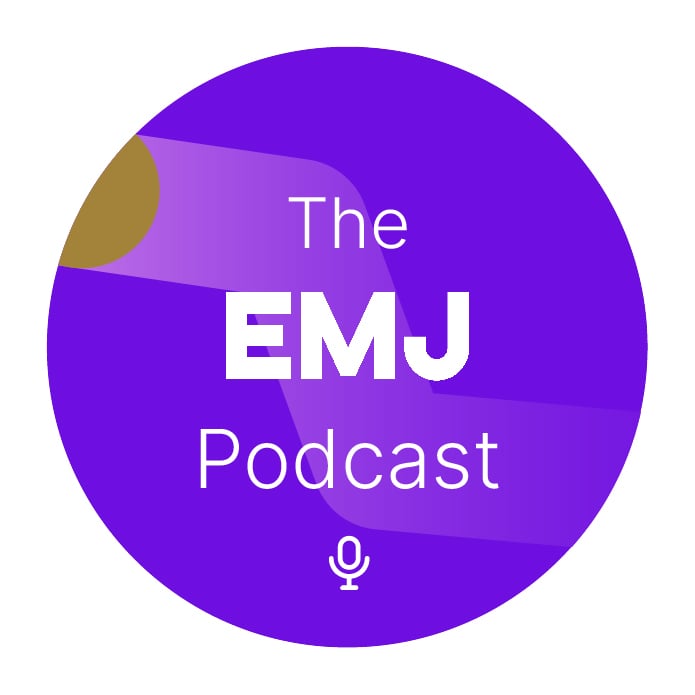Identification and Characterisation of the Diabetes Epidemic–Focusing on Neuropathy
Podcast 1 out of 4
The EMJ Podcast | Bonus Episode
In the first episode, Solomon Tesfaye and Oliver Binns-Hall explore the pressing issue of the diabetes epidemic and its most prevalent microvascular complication: neuropathy. They discuss the identification and characterisation of these critical aspects of diabetes and explore the causes, symptoms, and challenges of diagnosing neuropathy within the broader context of diabetes.
Spotify | Apple | Amazon Music | Download MP3 (mp3, 18:26 mins)
Understanding the Connection Between Diabetes and Pain: Proactive Identification of Diabetic Neuropathy
Podcast 2 out of 4
The EMJ Podcast | Bonus Episode
In the second episode, Solomon Tesfaye and Oliver Binns-Hall unravel the intricate relationship between diabetes and pain. They focus on the current approaches to identifying diabetic peripheral neuropathy and explore the risk factors, and current detection and management approaches, identifying the challenges associated with managing this multifaceted condition.
Spotify | Apple | Amazon Music | Download MP3 (mp3, 20:25 mins)
Changing the Future of Diabetic Neuropathy: Integrated Patient Care and Screening
Podcast 3 out of 4
The EMJ Podcast | Bonus Episode
In this third episode, Solomon Tesfaye and Oliver Binns-Hall consider the transformative potential for diabetic neuropathy care. They identify the importance of integrated patient care and the need for early-stage screening and diagnosis, discussing the evolving role of the podiatrist, and the need for a well co-ordinated foot care service. They also consider innovative screening solutions and the improvements needed in the chronic management of this condition.
Spotify | Apple | Amazon Music | Download MP3 (mp3, 21:19 mins)
Adapting the Future Recognition and Treatment of Diabetic Neuropathy
Podcast 4 out of 4
The EMJ Podcast | Bonus Episode
In this final episode, Solomon Tesfaye and Oliver Binns-Hall explore the dynamic landscape of the recognition and treatment of diabetic neuropathy across diverse clinical realities in various countries. They discuss the challenges, and solutions that can help improve the management of diabetic neuropathy in different healthcare settings worldwide.
Spotify | Apple | Amazon Music | Download MP3 (mp3, 17:29 mins)
Professor Solomon Tesfaye
Consultant Physician and Endocrinologist, and Research Director, Diabetes and Endocrinology, Sheffield Teaching Hospitals, UK
University of Sheffield, UK
Professor Tesfaye’s area of expertise is diabetic neuropathy and neuropathic pain, focusing on their epidemiology, risk factors, pathogenesis, central nervous system involvement and treatment.
In addition, he is a Visiting Professor at Shanghai Jiao Tong University and Adjunct Professor at Xiangya Hospital Central Southern University in China.
Professor Tesfaye has an extensive academic profile with publications, grants and awards for his scientific contributions in diabetic neuropathy and innovative, patient-centered diabetes care. He has been Chairman of the International Expert Group on Diabetic Neuropathy, and authored several consensus papers on the management of neuropathic pain.
Mr Oliver Binns-Hall
Podiatrist and Research Associate, Sheffield Podiatry Services, Sheffield Teaching Hospitals NHS Foundation Trust, UK
Mr Binns-Hall works as a podiatrist at Sheffield Podiatry Services and also serves as a Research Associate at Sheffield Teaching Hospitals NHS Foundation Trust in the UK. He specialises in wound healing and advanced diabetic assessment. His research investigates the early signs of neuropathy in patients with diabetes and explores the role of podiatry-led integrated care pathways.
This content has been supported by Viatris
Additional insights on diabetic peripheral neuropathy are available in a companion infographic, ‘Diabetic Peripheral Neuropathy: The Forgotten Complication of Diabetes’, which highlights the screening, diagnosis, and management of this complication to enhance understanding, drive earlier detection, and improve outcomes.








